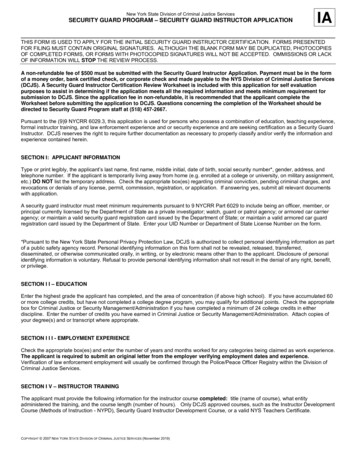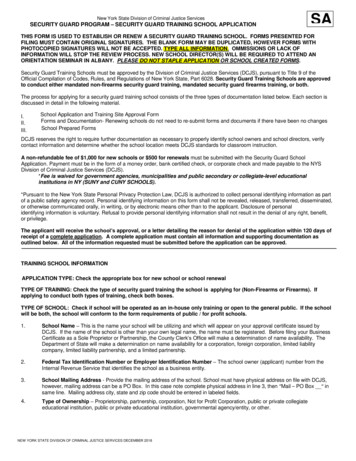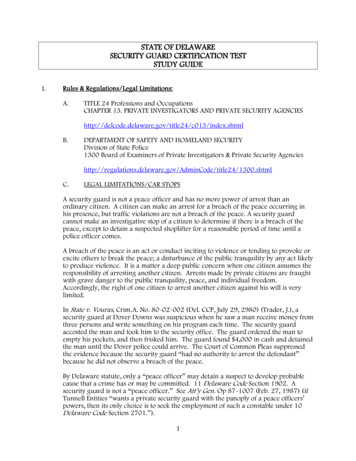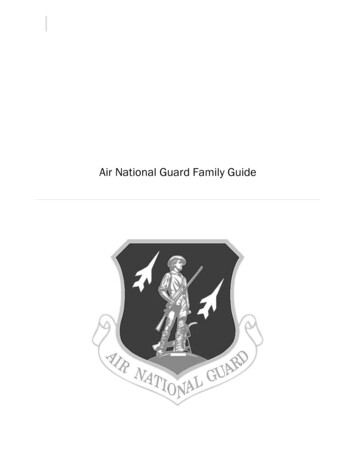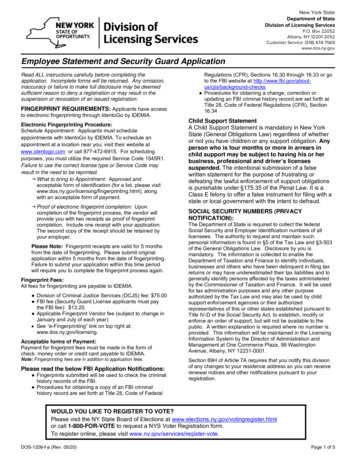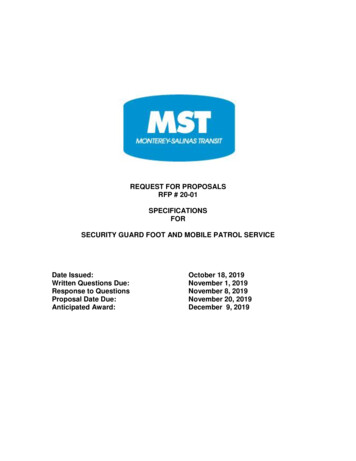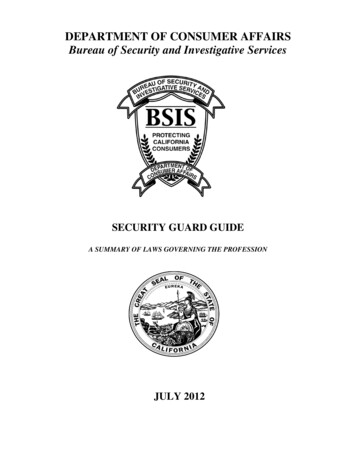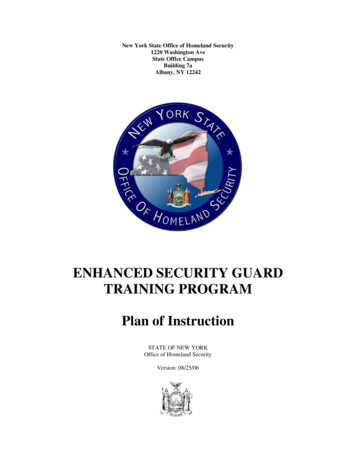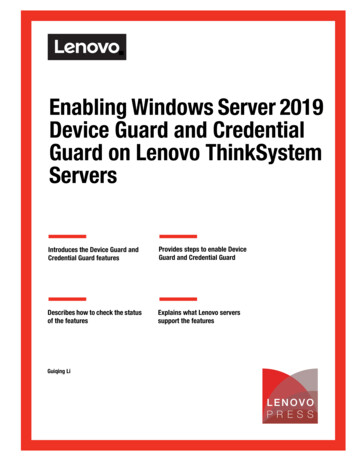
Transcription
Pre-CourseReading Material(PART 1)BASIC SECURITY GUARD (BSG)TRAINING COURSEFOR THE UAE(V5)Security Company Name:Security Guard Name:Date of Receipt:Copyright Registration # 1079064 NSI/A. Professor Peter D'Arcy.UAE 2010 All Rights Reserved. This materialmay not be re-printed or re-produced in whole or in part in any form or by any means without the prior permissionin writing by the authors/owners.
IMPORTANT NOTICEThis document should be given to all guards already in the UAE one week beforeattending NSI to allow them study time. It should also be given to all people in therecruiting process in their home country before they are employed by a UAEsecurity company. It must be signed and dated by the future applicant at the timeof issue and receipt. (UAE security companies may be financially liable for anymoney paid by guards to recruitment companies)This Pre-Course Reading and Review Information package must be brought to theNSI on the first day of NSI Course for inspection by the class instructors. Guardswill be asked to confirm whether they paid any recruitment fees, how much andwhen they were given this Part 1 information package and Part 2 study review.PART 1.Introduces the student to the NSI and its administration, rules, facilities andemergency procedures. It also includes information the government want thestudent to know such as the student’s rights under the Ministry of Labour andMinistry of Interior, which are explained. There are also references to privatesecurity in the UAE; the Regulatory Authority-PSBD, its licensing and examinationprocess, and its other functions; the NSI and its training evaluation methodologies;and finally, an introduction to the UAE.STUDENTS SHOULD STUDY PART 1 AS THEY WILL BE TESTED ONTHIS PRE-COURSE READING MATERIAL WHEN THEY ATTEND NSI.NOTE:This Pre-Course reading material forms Module 1 of the BSG Course.On the first day of training, students start with Module 2 Lesson A "The Roles andResponsibilities of a Security Guard". (see Part 2)PART 2.Should be read every evening after training as it shows all the training materialscovered during the teaching day and is a helpful way to study and review. Also,remember to read your Notebook, which also contains 64 valuable pages ofinformation and guidelines in Arabic and English. NSI/A. Professor Peter D’Arcy.UAE 20102
Module 1 – IntroductionLesson A - Administration & Rules of NSIAdministration: This course has been developed to introduce basic security guard training in the UAE. This course and its evaluation process are designed to prepare students for their PSBDexam, which will lead to their PSBD License, and will allow them to work as a privatesecurity guard in the UAE. Course Duration: 40 teaching hours over 5 consecutive days 7 Modules - each Module contains several lessons. Courses run from Saturday to Wednesday. Students must be at the NSI 0730 hours.Classes finish at 1630. Students will be allowed 15-minute breaks for each 2-traininghours including 40-minute lunch break or its equivalent. Instruction is classroom based with practical exercises.Student Participation: Students are expected to participate by paying attention to the instructor, answeringquestions, completing written exercises and taking part in practical exercises. If a student fails, he/she will have to return to the NSI to take the whole course againwhere he/she will be given a second chance to get his/her PSBD License.Rules: Attendance must be 100%. Students who are late or miss classes will automatically besent home. (Instructors will check every guard against their name and photo ID) Any guard that leaves NSI without permission or notice is automatically cancelled fromthe course and lose their seat. Companies must submit a new application and fees if theywish to attend again. Any guard caught cheating in examination, either for the benefit of themselves or anotherwill automatically fail. Guards must be in possession of PSBD Licence and/or Company picture ID everydaythey are on training. All students, no exceptions, must be in company uniform for the duration of the course. Students must dress professionally at all times. This professional dress includes shaving, haircuts and personal hygiene. Any student security guard using inappropriate, bad and or disrespectful language orattitude to any member of NSI staff will be dismissed from NSI. No chewing gum or spitting around the premises. No Loitering. Refreshments may be taken in the classrooms or cafeteria. (Students are responsible toclear their own mess). All NSI facilities will be treated with care and respect such as toilet and use of waterdispensers and food/drink dispensing machines. NSI/A. Professor Peter D’Arcy.UAE 20103
No students are allowed to go to the Administration Building without permission fromtheir instructor.The No Smoking rule applies anywhere on NSI premises. Students may go to thedesignated smoking area located offsite. (Sand parking area)Student’s mobile phones will be surrendered to the instructor before the start of the classand will be returned at the end of the day.No student is allowed to copy training materials or photograph materials with theirmobile phones or by any other means or otherwise reproduce training materials (handcopying) except for the purpose of note taking and learning.Prayer Room: All Muslim students are encouraged to use the prayer room located on the 2nd floor ofbuilding 1 and the foyer of the Head Office Annex. Wudu area is located behind the toilets Students are advised when going to prayer and returning from prayer, to do so quietly andnot to disrupt other classes.First Aid Room: NSI is equipped with first aid materials located in the Main Office Building and inInstructor offices in every building. There is a fully qualified first aide staff member and male nurse on site during schoolhours. Students who do not feel well or become sick should advise their class instructor whowill take appropriate action. Students should carry their medical insurance card (Damanor other card) when at NSI.Fire and Fire Evacuation: In the event of a fire, students are advised to follow the directions of their instructor orother staff member. Fire extinguishers can be found near the stairs on every floor in each building. If you see a fire or smoke, you must raise the alarm by shouting FIRE! FIRE! FIRE! andinitiate the alarm. Students will be required to evacuate in an orderly fashion to the assembly area outside tothe left of the NSI as they exit. (Sand parking area) where all students/staff will becounted by the Fire Marshall e.g. (NSI Training Supervisor Ruwan).Training Materials provided by NSI: Student Course Manual (NOT TO BE COPIED OR REMOVED FROM THE SCHOOL) Student Notebook/ Student note pad and pencil Student Pre-Course Reading Material and Course Review Parts 1 & 2. This is given by NSI to your company who should issue to students one week before thecourse or prior to offering employment in their country of recruitment. NSI/A. Professor Peter D’Arcy.UAE 20104
Lesson B – Your Rights under Ministry of Labour (MOL) &Ministry of Interior (MOI)Important Information All the information provided in Module 1 Lesson B has been provided by the Ministry ofLabor (MOL) & Ministry of Interior (MOI). PSBD This information may be subject to change anytime Students who have any questions should refer them to the appropriateMinistry/Organization NSI is not responsible for the information contained in Module 1 Lesson B or anyfuture amendments to the information supplied in this Lesson.Before arriving in UAE The UAE Government has signed a number of agreements with labour-exportingcountries. It is not legal for any of these countries to allow UAE security companies or recruitingcompanies to charge any commissions or other payments from workers to getemployment, either before or after arrival in the UAE. You will be required to take a one week training and examination by the police in theUAE. You must be able to speak, read and write English or Arabic or you may fail andbe sent home again.Financial Responsibility It is the responsibility of the Employer ONLY to pay ALL government fees and otherexpenses relating to labour recruitment and employment. You should not pay for uniforms or equipment such as traffic vests or other equipment todo your job, except Personal Notebooks (costs 40 dirhams per year, or 76 fils per week).THE NOTEBOOK IS PART OF A GUARD'S PROTECTION. All security guards in the UAE should now be receiving minimum wage of AED 2,000per month (expatriates) plus the potential for overtime. Guards under training may receive a reduced salary until they have become licensed. As soon as a guard receives his/her license from the police, he/she MUST be on fullsalary starting from the date of the license.Security Guard’s Labour Contract Before signing your contract, you must make sure you are signing an official MOLlabour contract. Understand this is the only document that determines the relationshipbetween the employer and worker. The contract specifies the rights and responsibilities of both parties. No other contract is acceptable.Signing the Contract Do not sign before you have read and understood the contract. You must know if it is a Limited or Unlimited Contract. (Limited means fixed e.g. 2years; Unlimited means it is open-ended and can run for years). NSI/A. Professor Peter D’Arcy.UAE 20105
If you do not understand the contract, have your employer translate it to your ownlanguage.Make sure the employer gives you a copy of your contract. HE MUST GIVE YOU ACOPY BY LAW.Keep this contract in a safe place whilst you are in the UAE. IT IS PART OF YOURPROTECTION.Labour Cards You must not work without a labour card. You must show it to Labour Inspectors or other government officials when asked. You must get your labour card within 60 days of your entry to the UAE. If you do not get this card, report the matter to MOL immediately.HELP You can down load a copy of your labour card, your employment contract and labourrights guide at: E-Nataswal at MOL website: spx?lang arab Also find out about your company’s policies & procedures.Official Work Hours 8 Hours a day unless you work in hotels or security, when you can work up to 9 hours aday maximum. This shift should allow you at least 1 hour break a day minimum. Travelling between work and home is not included. The 8 hour day is reduced to 6 hours during Ramadan. If an employer wants a guard to work overtime, this can only be done with the guard’sconsent. The employer cannot force you to work overtime. The extra overtime hours shall not exceed 2 hours a day, meaning a maximum of 11hours. Currently, maximum is 12 hours per day but is under review by MOL. Overtime pay rate is an extra 25% per hour, e.g. 125% of your hourly rate for two hoursunless you work overtime between 9.pm and 4.am, then the pay rate is at 50% OR 150%of your hourly rate for overtime.Official Hours (Summer Time) No working in direct sunlight between 12:30.pm and 3.pm in the months of July andAugust.Wages Payment System You must only be paid through the Wages Protection System (WPS).IMPORTANT NOTICE If you employer delays to pay your salary for more than two months, you can go toMOL and request to transfer to another company without any need for approvalfrom your present company. You can legally leave!!! NSI/A. Professor Peter D’Arcy.UAE 20106
Weekly Rest Day The Law allows all workers one rest day a week. If employer asks you to work on your rest day and you agree, you must get another dayoff or be paid at the pay rate of 150% for all the hours you work that rest day.Annual & Other Leaves You must submit your written application for Annual leave for approval to youremployer as soon as you know the dates. Annual leave is calculated at the rate of 2.5days for every month’s work. Normal Annual Leave is 30 days pa. Any extension of annual leave must get the employer’s written approval. Maternity Leave is for 45 days. Sick leave; first 15 days at full pay, next 30 days with half pay. (Minimum Standard andcan be higher) Haj. A worker can have 30 days unpaid leave to perform Haj Pilgrimage.Statutory Leaves 1x day for New Year’s Day (Hegira) & Christian New Year’s Day. 1x Prophet Mohamed (PBUH) Birthday. 1x Nocturnal Journey & Ascension of Prophet. 1x National Day. 2x Days for Lesser Bairam. 3x Days for Greater Bairam. IF YOU HAVE TO WORK ON ANY OF THESE DAYS, YOU MUST GET PAID 50%PAY RATE EXTRA FOR THAT DAY AND ANOTHER DAY OFF AS WELL AS50% BONUS. IF THERE IS NO OTHER DAY OFF GIVEN THEN THE PAY SHALLBE NORMAL SALARY 150%.Accidents at Work You should go to hospital and receive treatment for which the employer MUST cover allmedical expenses until you recover. If an employer fails to cover your expenses, the worker must contact the MOL.Employer’s RightsThe employer has rights as well: You must protect your company from a breach of: Confidentiality/giving out company information. Abide by the work schedule. Protect companies' property. Respect its reputation. Follow company Health and Safety guidelines. Follow companies policies and procedures. Keep good time and appearance. NSI/A. Professor Peter D’Arcy.UAE 20107
TerminationA company may terminate your employment if: You reveal company secrets/information (The employer must be able to show evidence) You have a false identity or nationality You submitted forged documents If you make a mistake resulting in substantial loss If you are sentenced by a Court involving Honor, honesty, public morals, alcohol, drugsin working hours or before starting work. If you assault an employer or his representative. If you are absent from work for 7 consecutive days or 21 non-consecutive days unlessyou can provide medical proof.Ending a Contract Both Employer and Employee may terminate an unlimited contract by giving 30 daysnotice and a valid reason before termination. In such a case you shall be entitled to the end of service remunerations as per UAELabour Law. It is always a benefit to the worker to report these activities to MOL in advance as it willprotect you from any action that may be taken by your employer.Complaints Against Employers If you file a complaint against an employer, you MUST NOT work for another employerduring that time of the case without approval of the MOL. Upon cancellation/termination, do not sign anything until you receive all yourentitlements. Then cancel your labour card and prepare to leave the UAE within 30 days or settle youraffairs to join another company.Which Ministry Do I Deal With? All employment complaints, questions or actions associated to your employment contractand labour conditions are matters for the Ministry of Labour (MOL). All questions in relation to your security work, security license, PSBD exams, workaccommodations, or abuses by Security Supervisors or Security Managers are matters forthe Ministry of Interior (MOI) Abu Dhabi Police, PSBD. Both agencies can be contacted on their internet websites.Tell Others!!!! Ensure when you leave your training at NSI that you help your work friends andcolleagues to understand this information and their legal rights. The MOL & MOI (PSBD) are government agencies set up to ensure that you as a workerget your rights but also to ensure you understand your obligations. On behalf of the MOI (PSBD), MOL and NSI, we wish you a safe and prosperousexperience during your time in the UAE. NSI/A. Professor Peter D’Arcy.UAE 20108
Lesson C – Understanding Private Security in the UAE Private security is a commercial service providing protection and security to clients.The goal of security is the identification and prevention of problems that may causeharm or loss to your client.Private security protects People – employers, employees or the public Property – buildings, equipment or materials Information – documents, verbal, data or data storage, video and other diverse forms ofinformation. The Arabic word for security is “Amin” which means safe or free from dangerTwo major divisions of security1. Public (police)2. Private (security companies)Public Security (Police) Private security will deal with the police during the course of its work. This will bediscussed in greater detail in Module 2 Lesson G. BUT it is important to know two things:(a) that information normally flows one-way from private security to police (not bothways).(b) when dealing with the police, private security should request the police officer’sname, rank, contact telephone number, police station and case number. Private security is not just guard services, but also a range of other activities. (Seeexamples below)Areas of Private Security Work1. Shopping malls2. Apartment buildings3. Commercial areas4. Industrial areas5. Hospitals6. Events venues7. Airports8. Mobile security patrols9. Schools/Colleges10. And many other locationsTypes of Private Security Services1. Building reception/front of house security2. Retail security for customers and staff3. Access and Egress controls to locations NSI/A. Professor Peter D’Arcy.UAE 20109
4. Human and electronic e.g. mobile patrol services or static guarding & CCTV5. Protecting clients, clients’ property and interests6. Cash-In-Transit7. Physical protection8. Fire watch and response/Alarms/CCTV9. Dealing with crimes e.g. credit card fraud or shop lifting.10. Supporting the authorities and laws of the UAE.Responsibility for Private Security Clients are responsible for the private security companies/security guards they hire. Private security companies are responsible to their clients, their security employees andthe Private Security Regulatory Authorities (PSBD). PSBD are responsible for oversight of the private security industry e.g. licensing,examination and enforcement of regulations.Lesson D - Federal Regulatory AuthorityPrivate Security Business Department (PSBD)HistoryPSBD is a unit of the Abu Dhabi Police and part of the UAE Ministry of Interior, formerlyknown as the PSBS. Security Regulation started in February 2002 and only operated in theEmirate of Abu Dhabi – today, PSBD is a Federal Department. The staff of the PSBD is amixture of police officers and civilian support staff. PSBD has offices in several Emirates.PSBD’s 6 specific responsibilities are:1. Establishing regulatory standards2. Approving security companies and security guards3. Ensuring quality security training standards4. Examining & Licensing security companies & guards5. Inspecting companies and guards, ensuring compliance with Federal Law.37 andRegulations and relevant Emirati Decrees e.g. 557.6. Enforcing the Private Security Law with fines and prosecutions through a process ofdaily monitoring and review.Private Security Business Department (PSBD) PSBD establishes required basic guard standards and training requirements, such as thebasic security guard training course given at the National Security Institute (NSI). Training and evaluations are carried out by the NSI which is owned by the Ministry ofInterior, Abu Dhabi Police. Security examinations and licenses are issued by the PSBD. NSI/A. Professor Peter D’Arcy.UAE 201001
PSBD Inspectors inspect guards, work locations and company offices to ensure standardsare met and the law and regulations are followed and enforced.Requirements: Companies must comply with Private Security Law, Regulations and Emirati Decrees Security companies and guards must comply with PSBD Inspectors if approached Companies and guards can be fined if they fail to comply with the Private Security Lawor inspections. You will be shown examples of police ID cards and PSBD Inspectors ID cards during thecourse.Security Company Licensing: Security companies are responsible for their employees, to ensure they are properlytrained and licensed to carry on security work. Security companies are responsible for ensuring that employees have proper immigrationand labour visas and the terms of the labour contract are met. Security companies are responsible for ensuring that employee uniforms have beenapproved by PSBD, that employees are issued uniforms at no cost, and that employeescarry only equipment issued by their company and authorized by PSBD. All security guards must be individually licensed. (You will be shown an example ofPSBD security guard’s ID on the course. You are responsible for ensuring that: your full uniform is worn properly at all times, and your personal hygiene is not questioned. You are responsible for ensuring that your PSBD license is current and that it is worn onyour uniform as required by law at all times.It must be visible!!! You are required to surrender your license to an Inspector or to submit to photographstaken by an Inspector. You are required to cooperate fully with Inspectors.FAILURE TO DO SO FINE Emirati Decree 557 of 2008 has a list of offences and fines for companies and securityguards.Security Company and security guard offences: There are a number of offences in the current Private Security Law that could becommitted by individual security companies and security guards. These offences can also incur fines directly to the guard. The Notebook has a list of common offences and fines.Security guard offences: There are a number of offences in the current Private Security Law that could becommitted by individual guards. These offences can also incur fines directly to the guard. The Notebook has a list of common offences and fines for guards (see examples below). NSI/A. Professor Peter D’Arcy.UAE 201000
Telling someone to break the Private Security Law and Regulations or anyinstructions of the PSBD Not wearing an identification card as required by law Not properly wearing the company uniform Failing to maintain a uniform appearance Failing to inform your employer within 24 hours of the loss of your PSBD licence Sleeping while on duty Absence from duty or leaving place of duty for any reason Not wearing or carrying all uniform accessories (Notebook and 2 pens) Cheating or helping anyone cheat on a training test Misleading or giving false information to PSBD inspectors Acting in an unprofessional manner toward others while on duty Doing work other than that assigned Failing to bring your security licence to a test Abuse of position for personal gain or benefit of others Taking security licence outside the UAE Altering, damaging, or copying a security license Any other infringement determined by the competent authority e.g. losing ordamaging notebook (washing your notebook).The fines for each offence are shown in your training manual and in your personal (NSI)notebook.Lesson E - National Security Institute (NSI)History Training for the private security industry in the UAE was brought to Abu Dhabi inOctober 2001 from the Private Security Programs Division of the Justice Institute PoliceAcademy in Western Canada – a Department recognized and funded by the government. This training material was researched between 1994 and 1996 from existing trainingmaterials from several countries, including but not limited to, the USA, Canada, UK, andEurope. These government training standards formed the basis of training for the private securityindustry in Western Canada. From October 2001 to December 2002, advisors from the Canadian Police Academycarried out stakeholder consultations and further research in the UAE. This Canadian (international) Model of security training was then re-written to fit thecultural, societal, and legal norms of the UAE. Including a study of the UAE’s Constitutional and Islamic legal systems and procedures,including but not limited to the UAE Penal Code No.3 of 1987 and UAE PenalProcedures Law of 1992. All Training Materials provided by NSI are specially written for the UAE and protectedby international copyright law and UAE law. NSI/A. Professor Peter D’Arcy.UAE 201002
Ministry of Interior, Abu Dhabi Police, Private Security Business Section (PSBS)January 2003 to February 2009 NSI During this period, security companies were responsible for training their own securityguards.This was accomplished by the PSBS conducting Train the Trainers Courses for privatesecurity companies' in-house trainers and providing all the security companies with thesame single standards of private security training that was developed in the UAE prior toDecember 2002.After the PSBS trained the company’s instructors, the instructors returned to theircompanies with the PSBS Training Manuals and trained their own guards with 5-daystraining.After completing training, the guards attended PSBS for examination.Due to past problems with some security companies not following the training standardsand guidelines of the police, the PSBS (now the PSBD) stopped all companies fromconducting in-house training and directed all companies to send their security staff to theNSI for government controlled training and evaluation.Training and evaluation by NSI is necessary in order to take the PSBD licensing examwhich prepares the students for their work in security.TrainingNSI Training is: Classroom based Instructor led Using latest technology Involving student participation and practical exercises in a safe and friendly learningenvironment With a focus on student care and professionalism Students and NSI enjoy a pass rate of 92% NSI Faculty NSI faculty and staff have cumulative experiences that spans over 150 years of security,police, military and teaching experience. NSI staff comes from Canada, South Africa, Sri Lanka, Philippines, Sudan, Kenya,Egypt, Pakistan, India, and the UAE.NSI MottoSecurity through education!!! NSI/A. Professor Peter D’Arcy.UAE 201003
Lesson F - NSI Training & Evaluation, PSBD Examination/Licensing &Annual RenewalTraining DECLARATION: I WAS GIVEN THE PRE-COURSE READING MATERIAL &COURSE REVIEW ON (date) (Signed) All training for private security personnel can only be carried out by an instituterecognized and licensed by the Competent Authority (PSBD). In the Emirates of Abu Dhabi, Sharjah, Um Al Qwain, Ajman, Ras Al Kaimah andFujairah, the only institute is the NSI. The NSI is owned by the Ministry of Interior, Abu Dhabi Police. It works closely with allthe Competent Authorities in these Emirates and has an open policy of communicationwith companies.Process After recruitment by a security company, student security guards are sent to the NSI for5-days Basic Security Guard Training. Criteria of Evaluation: (a) Deportment; (b) Literacy & Comprehension; (c) Notebook Use& Maintenance; (d) Written Evaluation of guards' understanding of Training Materials.Students must pass each criterion. Pass mark is 70%. Students who successfully pass NSI evaluation and received their Certificate can apply tothe PSBD for the government examination and licensing. In order to gain access to the exam, students must take their company picture ID card(and/or PSBD License), and a copy of the NSI Certificate. This procedure may vary from Emirate to Emirate (e.g. Ajman) PSBD exams are carried out at the NSI location under the control of Abu Dhabi Police. Successful students receive their PSBD License immediately which is valid for 2 years.NSI Annual Renewal Training Even though the PSBD License is valid for 2 years, security guards must return to NSIevery 12 months for Annual Renewal Training. Failure to take and pass Annual Renewal Training at NSI will result in the guard failingand his license withdrawn after only 1 year. Students must understand Licensing and Training are separate and distinct activities fromeach other but support each other. NSI/A. Professor Peter D’Arcy.UAE 201004
Lesson G - Understanding the United Arab Emirates The UAE has 7 Emirates which are Abu Dhabi, Sharjah, Umm Al Quain, Fujairah,Dubai, Ajman, Ras Al KhaimahIt is a Muslim culture that mixes with cultures from around the worldThe main role of private security in the UAE is preventionCompanies and guards work together to make sure contracts are metImmigration law states that you must have a proper visaLabour law states that you must have a work permitLocal Citizens are 15% of population and expatriates are 85%. Population is over 5million.Common cultural offences in a Muslim Culture include: drunkenness and swearing/angerin public placesFridays have certain rules relating to work (see Module 1 lesson B) NSI/A. Professor Peter D’Arcy.UAE 201005
Student Course Manual (NOT TO BE COPIED OR REMOVED FROM THE SCHOOL) . All security guards in the UAE should now be receiving minimum wage of AED 2,000 per month (expatriates) plus the potential for overtime. Guards under training may receive a reduced salary until they have become licensed. As soon as a guard receives his/her license .

